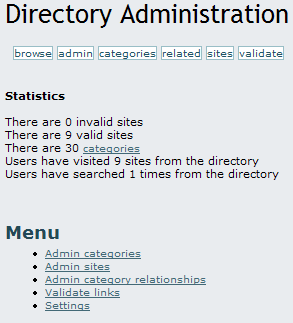History: DirectoryAdmin
Preview of version: 5
After the Tiki admin has set the basic directory configuration (see DirectorySettings ), go to the Application Menu and select Admin directory from the Directory menu item. This will open the Directory Administration page.

Buttons at the top and a menu at the bottom allow you to:
- Browse the directory
- Admin the entire directory
- Admin categories
- Admin related categories
- Admin sites (add, delete or edit them)
- Validate links users have suggested
- Go to the Tiki admin's settings page (if permitted)
As is evident from this screen shot, Tiki compiles several directory-oriented statistics:
- Invalid/valid sites
- Sites that have been validated (or not) by admins.
- Number of categories
- These are the sub-categories specific to the directory and are not the same as Tiki categories (see Category).
- This stat contains a link to the Admin directory categories page.
- Number of times users clicked through from your site to one of the links.
- Numer of times users have searched the directory
Let's look at these admin functions one at a time.
Managing categories
Clicking on categories will take you to the categories administration screen, which displays a Parent category (a drop-down list), a form to add new categories, and a list of sub-categories under the current parent category.

Note that categories are arranged as parents and children--much like a family tree. Over all the child categories is the Top category, which is displayed in the drop-down menu of this screen shot. You can create subcategories for the Top category or any other category by first selecting the category as the Parent category in this drop-down menu. Then, use the Add a directory category form to build new child categories beneath this parent.

The options are:
| Name | Category name |
| Description | Category description |
| Children Type | When browsing the category tree a line of text will be displayed below the category name. You can choose what goes in this line: the most-visited sub-categeories, the category description, or random sub-categories. |
| Maximum number of children to show | Once you decided what will be displayed below the category you can set up how many items will be displayed. You can choose none to eliminate the line below the category name. Note that if you decide to show the category description this option has no effect. |
| Allow sites in this category | Whether sites can be added to this category or not. You might prohibit sites in a category if you only want to use it to contain other sub-categories. |
| Show number of sites in this category | If enabled the number of sites in the category will be displayed next to the category name. |
| Editor group | You can indicate a Tiki group that will have admin permission for this category. These editors will be able to validate sites. |
| categorize | In addition to the categories of the directory, Tiki also uses global categories that apply to all objects within it. This option allows you to put your directory category within a Tiki category. To do so, first click show categories to see which Tiki categories are available (as has already been done in this screen shot). Select the appropriate categories and check categorize this object. See Category for more information on Tiki categories. |
At the bottom of the Admin directory categories page is a list of directory sub-categories for the parent category indicated by the drop-down menu at the top of the page.

Its columns indicate how a sub-category was configured with the Add a directory category form:
| name | In this example, four names are shown. |
| cType | Children type |
| view | Maximum number of children to show |
| allow | Allow sites in this category |
| count | Show number of sites in this category (number of sites in parenthesis) |
| editor | Editor group. In this example, a group named editor has been used. |
| action | Buttons to relate, edit, and delete categories, respectively |
Related categories
insert graphic
You can make relations between categories to let the user see a box to related categories when browsing one. In this screen you admin relationships between categories. First select the category that will be related as the parent categry, then choose the category related and click mutual if the relationship goes in both ways (A=>B, B=>A). The save will add the relationship. Below the box to relate categories you will see a list of the categories that are related to the parent category selected, you can change relationships and remove them if you want.
Managing sites
insert graphic
insert graphic
This screen is used to admin sites, you can choose any parent category and then view the category sites, edit them or add new sites to the category. Note that when adding site to a category you can also put the site in many other categories so you don t have to enter the same information many times. The list shows the information about each site as will be presented in the browser.
Site Validation
insert graphic
The site validation screen is used to validate user-suggested sites, you can edit the sites and approve them or remove them as you want.
Who is working here generally? Link UserPage.